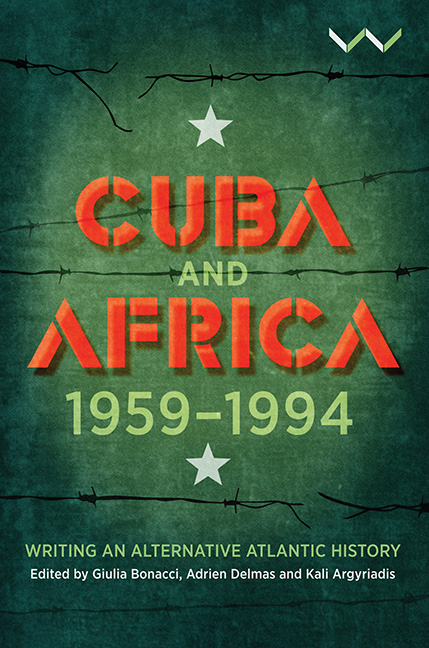Book contents
- Frontmatter
- Contents
- Figures and Table
- Foreword
- Acknowledgements
- Acronyms and Abbreviations
- Timeline of Historical Events
- Map of Africa, 1994
- Introduction Reconfiguring the Cuba–Africa Encounter
- Part I Politics and Solidarity
- Part II Trajectories
- Part III Voices
- Part IV Reconstructing History, Reconnecting Roots
- Contributors
- Index
Chapter 1 - Cubans in Algiers: The political uses of memory
Published online by Cambridge University Press: 15 June 2021
- Frontmatter
- Contents
- Figures and Table
- Foreword
- Acknowledgements
- Acronyms and Abbreviations
- Timeline of Historical Events
- Map of Africa, 1994
- Introduction Reconfiguring the Cuba–Africa Encounter
- Part I Politics and Solidarity
- Part II Trajectories
- Part III Voices
- Part IV Reconstructing History, Reconnecting Roots
- Contributors
- Index
Summary
Algeria and Cuba first established friendly relations in the context of the Algerian War of Independence (1954–62). On 27 June 1961, Cuba was the first country in the western hemisphere to recognise the Provisional Government of the Algerian Republic (GPRA) in exile in Tunisia, Egypt and Morocco. In October of the same year, the Cuban government sent an emissary, Jorge Ricardo Masetti (1929–64), who was a friend of Castro, with a message of support for the GPRA. Then in December, in a decisive show of support, the Cuban ship Bahía de Nipe delivered weapons to the National Liberation Army (ALN), the armed wing of the National Liberation Front (FLN), before returning to Cuba with 78 wounded Algerian fighters and 20 orphaned children. The weapons were transported to Oujda in Morocco, headquarters of the ALN General Staff, under the command of Colonel Houari Boumediene.
This strong signal of support has remained in the Algerian collective memory, both official and public. Nor have the Cuban people forgotten the support of President Ahmed Ben Bella at the time of the 1962 missile crisis. Following an official visit to the United States, the Algerian president visited Cuba two days after US U-2 spy planes produced evidence of Soviet missile launch sites on the island. On that occasion, he proclaimed: ‘We will never forget all you did for our refugees in Tunisia and Morocco. Comrade Fidel Castro, the National Liberation Front of Algeria awards you the mujâhid medal of honour, as a token of our gratitude.’
Ben Bella also supported Cuban demands for the return of the US naval base at Guantánamo Bay and celebrated the first anniversary of the Bay of Pigs victory over an American-led invading force. This political act is still commemorated in the official Cuba media. Fidel Castro subsequently made statements praising the courage of the Algerian people in supporting Cuba when the United States declared an embargo in February 1962. Whenever a Cuban leader visits Algeria or an Algerian official visits Cuba, Ben Bella's gesture is remembered in official speeches and in the media, as well as in Granma, the official organ of the Cuban Communist Party.
- Type
- Chapter
- Information
- Cuba and Africa, 1959-1994Writing an Alternative Atlantic History, pp. 29 - 49Publisher: Wits University PressPrint publication year: 2020

